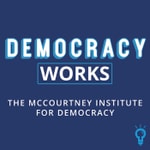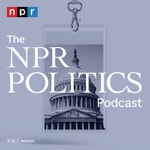Democracy Works – Détails, épisodes et analyse
Détails du podcast
Informations techniques et générales issues du flux RSS du podcast.

Democracy Works
Penn State McCourtney Institute for Democracy
Fréquence : 1 épisode/9j. Total Éps: 312

Classements récents
Dernières positions dans les classements Apple Podcasts et Spotify.
Apple Podcasts
🇺🇸 États-Unis - government
27/07/2025#92🇺🇸 États-Unis - government
15/07/2025#95🇺🇸 États-Unis - government
14/07/2025#77🇺🇸 États-Unis - government
13/07/2025#88🇺🇸 États-Unis - government
12/07/2025#60🇺🇸 États-Unis - government
11/07/2025#43🇺🇸 États-Unis - government
10/07/2025#68🇨🇦 Canada - government
08/06/2025#97🇨🇦 Canada - government
07/06/2025#77🇨🇦 Canada - government
06/06/2025#49
Spotify
Aucun classement récent disponible
Liens partagés entre épisodes et podcasts
Liens présents dans les descriptions d'épisodes et autres podcasts les utilisant également.
See all- http://www.futurehindsight.com
132 partages
- https://www.podcastawards.com
52 partages
- https://twitter.com/milaatmos
264 partages
- https://twitter.com/DemParadox
173 partages
- https://twitter.com/MilesTaylorUSA
12 partages
Qualité et score du flux RSS
Évaluation technique de la qualité et de la structure du flux RSS.
See allScore global : 69%
Historique des publications
Répartition mensuelle des publications d'épisodes au fil des années.
Making Peace Visible: In search of good conflict
Épisode 265
lundi 8 juillet 2024 • Durée 33:21
While Democracy Works is on summer break, we bring you an episode from our friends at Making Peace Visible, a podcast that ignites powerful conversations all over the world about how the media covers peace and conflict. This episode features journalist and author Amanda Ripley. We've wanted to have Amanda on the show for a long time and are grateful to the Making Peace Visible team for sharing this conversation with us!
After over two decades as a journalist, including ten years covering terrorism and disasters for TIME Magazine, Amanda Ripley thought she understood conflict. But when momentum started to build around the candidacy of Donald Trump, she questioned what she thought she knew. Ripley interviewed psychologists, mediators, and people who had made it out of seemingly intractable conflicts for her book, High Conflict: Why We Get Stuck and How We Get Out.
In this conversation with host Making Peace visible host Jamil Simon, she shares insights about how people in conflict can move forward, and how journalists can get at the "understory" of what's beneath any conflict.
Order Amanda Ripley’s book, High Conflict: Why We Get Stuck and How We Get Out. Watch Amanada’s talk on High Conflict for The Alliance for Peacebuilding. Follow her column in the Washington Post.
Season finale: Protests, debates, and the "meh" election
Épisode 264
lundi 3 juin 2024 • Durée 36:34
We've reached the end of another school year and another season of Democracy Works. Before we go on summer break, Michael Berkman, Chris Beem, and Candis Watts Smith reflect on recent events and what's to come this summer. We do this by taking a look back at some of our previous episodes:
The real free speech problem on campus: Penn State's Brad Vivian on the problems with "campus free speech" discourse and media coverage. We discuss how this narrative has been applied to protests about the war in Gaza that happened on some campuses near the end of the spring semester. Follow Brad's Substack for his more recent work on the Gaza protests and more.
A different kind of political divide - Yanna Krupnikov from the University of Michigan on the divide between people who follow politics closely and those who don't. We're seeing this divide play out in recent polling that shows support for Donald Trump is higher among people who say they are not politically engaged, while support for Biden is higher among those who follow news and politics more closely.
Debating the future of debates: John Hudak from Brookings talks about the value of presidential debates to democracy. We recorded this episode in 2022 after the RNC announced it would not participate in events organized by the Commission for Presidential Debates. Now that two debates are scheduled for the next few months, we discuss whether they'll actually happen and how much they'll matter.
This is our last new episode until early September. We'll use the next few months to plan for our fall season. Please send us an email if you have ideas for topics we should tackle or guests we should interview. Have a great summer!
A different kind of political divide
Épisode 255
lundi 29 janvier 2024 • Durée 39:58
As a Democracy Works listener, you probably follow politics pretty closely. And we're going to go out on a limb and say that many of the people in your life do, too. But what about everyone else? People who casually keep up with political news or maybe tune iit out entirely.
Scholars Yanna Krupnikov and John Barry Ryan argue that America might not be as polarized as we think because the media and political observers over-index on people who are deeply invested in politics at the expense of those who are not as engaged. They call this phenomenon "the other divide" and it's the subject of their most recent book. Krupnikov and Barry Ryan join us on the show this week to share their research on levels of political involvement and how it translates to media coverage.
As Candis Watts Smith says at the end of the episode, we hope that this conversation will inspire some epistemic humility.
Krupkniov is a professor of communication and media at the University of Michigan. Barry Ryan is associate professor of political science at the University of Michigan. They are the authors of The Other Divide: Polarization and Disengagement in American Politics.
A summer of the individual vs. the common good
Épisode 185
lundi 30 août 2021 • Durée 30:11
We're back after our summer break. Michael, Chris, Candis, and Jenna catch up on what happened over the summer, from COVID vaccine mandates to school board chaos to the refugee crisis in Afghanistan. The underlying theme of it all is one of democracy's central tensions — the collective vs. the individual.
The tension between individual liberty and the common good plays itself out in America's COVID response, debates over how race and history are taught in schools, and how we respond to the humanitarian crisis in Afghanistan. We discuss all of those issues this week and reflect on what our responsibilities are as democratic citizens.
Related EpisodesRefugees and the politics of displacement
The clumsy journey to antiracism
Additional InformationChris Beem in The Conversation: Why refusing the COVID-19 vaccine is immoral and un-American
Extreme maps, extreme politics [reboradcast]
lundi 23 août 2021 • Durée 39:46
As redistricting begins across the country, we revisit our conversation with journalist and author David Daley about the consequences for American democracy if gerrymandering happens again this time around. This episode originally aired in January 2021, not long after the insurrection at the U.S. Capitol.
Daley has spent the past decade covering attempts by politicians to draw those maps to their advantage in a practice known as gerrymandering. He's also covered the groups of citizens across the country who pushed back against them to win some major reforms that will make the process look different now than it did in 2010.
Daley is a journalist and author of Unrigged: How Citizens are Battling Back to Save Democracy. His work has appeared in the New Yorker, the Atlantic, Slate, the Washington Post, and New York magazine. He is a senior fellow at FairVote, the former editor of Salon, and lives in Massachusetts.
Additional InformationDaley's op-ed on democracy deserts in The Guardian
Unrigged: How Americans are Battling Back to Save Democracy
Related EpisodesOne state's fight for fair maps
Next-generation democracy: An interview with high school student Kyle Hynes, who won Pennsylvania's citizen mapmaking contest.
Jan-Werner Müller on democracy's rules
lundi 16 août 2021 • Durée 49:08
Democracy and populism diverge at a single point. It’s like a fork in a road where both traditions depend on a common history, but they split in two. At first it may seem the choice doesn’t matter. You believe that eventually they will both lead to the same destination except they don’t. The choice leads to two different outcomes. Populism uses some of the same language of democracy. It has a similar vocabulary. But as we go farther down its path, the less in common they have with each other.
Jan-Werner Müller is among the most recognizable voices on the subject of populism and democracy. This conversation from the Democracy Paradox podcast touches on some of their most challenging aspects from political leadership to majority rule to militant democracy. This conversation explores some of the ideas at the heart of this podcast. Ideas that give definition to the very meaning of democracy.
Müller is a professor of politics at Princeton University and author of Democracy Rules and What is Populism?
Additional InformationJan-Werner Müller at Princeton Politics
Does Congress promote partisan gridlock? [rebroadcast]
lundi 9 août 2021 • Durée 39:25
Some of the most talked-about issues in Congress these days are not about the substance of policies or bills being debated on the floor. Instead, the focus is on the partisan conflict between the parties and the endless debate about whether individual members of Congress will break with party ranks on any particular vote. This behavior allows the parties to emphasize the differences between them, which makes it easier to court donors and hold voter attention.
Some amount of competition between the parties is necessary in a healthy democracy, but have things gone too far? Frances E. Lee joins us this week to explain.
Lee is jointly appointed in the Department of Politics and the Woodrow Wilson School of Public and International Affairs, where she is Professor of Politics and Public Affairs. She is the author of Insecure Majorities: Congress and the Perpetual Campaign and The Limits of Party: Congress and Lawmaking in a Polarized Era with James M. Curry.
Additional InformationLee's book, Insecure Majorities: Congress and the Perpetual Campaign
Her lecture at Penn State on lawmaking in a polarized era
Related EpisodesPete Davis is dedicated to the hard work of democracy
lundi 2 août 2021 • Durée 36:25
Many of us can recall the experience of scrolling through our phones or streaming TV apps without ever choosing something to focus on. Pete Davis describes this an "infinite browsing mode" and argues that it creates a culture where democracy can't fully thrive.
Davis is cofounder of the Democracy Policy Network and author of Dedicated: The Case for Commitment in an Age of Infinite Browsing. His work is grounded in the notion of "long-haul heroes," or the people who show up day in and day out to make progress on the issues they care about while building stronger communities in the process. This could be anyone from the go-to event organizer in your town to people who work on nationwide campaigns for issues like racial equality and LGBTQ rights.
This work has always been difficult, but Davis argues it's even harder now because of the constant distractions that our media environment provides, along with the FOMO and related feelings that prevent us from dedicating ourselves to anything in the long term. We unpack all of that in this episode and discuss how Davis is turning his ideas into action through the Democracy Policy Network.
Related EpisodesAdditional InformationDedicated : The Case for Commitment in an Age of Infinite Browsing
Masha Gessen on the Moscow duel
lundi 26 juillet 2021 • Durée 28:57
Three pillars hold up autocracy in Russia, author and New Yorker staff writer Masha Gessen says: media control, sham elections and downright terror. But the opposition movement spearheaded by imprisoned activist Alexei Navalny has struck at the heart of all three. This time on the show, Gessen explains how — and measures the power of democratic aspirations in a country struggling against corruption with hope, against the past with visions of a happier future.
Navalny, a lawyer who has become President Vladimir Putin’s chief political rival, leads the Russia of the Future party, whose motto is “Russia will be happy.” In prison, his health failing, and recently off a 24-day hunger strike, Navalny continues to command respect — and a vast YouTube following — in part because he is brave enough to fight the system, even if it costs him his life, Gessen says.
It’s a powerful message for a generation from whom many of the tools of critical social analysis have been withheld. Against the odds, Navalny’s resistance is inspiring young people who have grown up with no ruler other than Putin, a former KGB officer who views the totalitarian past with nostalgia.
This episode comes from our colleagues at Democracy in Danger, a production of the Deliberative Media Lab at the University of Virginia.
Additional InformationRelated EpisodesWalter Shaub on transparency, ethics, and democracy
lundi 19 juillet 2021 • Durée 49:25
Can transparency, oversight, ethics and accountability save American democracy? What can Congress do to create lasting ethics reforms? How would the For the People Act change ethics rules for the legislative, judicial, and executive branches of the U.S. government and are the changes enough? How can the Office of Government Ethics and Office of the Inspector General contribute to democratic accountability? How can Congress get a toe hold into reigning in presidential power?
In this episode of the Democracy Matters podcast from the JMU Center for Civic Engagement, hosts Abe Goldberg, Carah Ong Whaley, and Angelina Clapp talk with Walter Shaub, who leads the Ethics and Accountability Initiative at the Project on Government Oversight about what elected and other government officials and the public can do to create and implement long-lasting reforms to shore up the barricades against authoritarianism.
Additional InformationProject on Government Oversight









